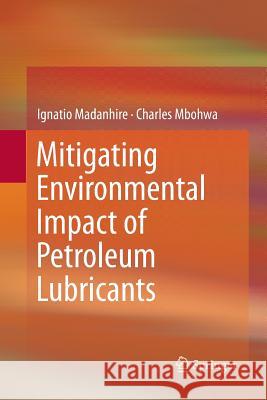Mitigating Environmental Impact of Petroleum Lubricants » książka
topmenu
Mitigating Environmental Impact of Petroleum Lubricants
ISBN-13: 9783319810218 / Angielski / Miękka / 2018 / 239 str.
Kategorie:
Kategorie BISAC:
Wydawca:
Springer
Seria wydawnicza:
Język:
Angielski
ISBN-13:
9783319810218
Rok wydania:
2018
Wydanie:
Softcover Repri
Ilość stron:
239
Waga:
0.38 kg
Wymiary:
23.39 x 15.6 x 1.42
Oprawa:
Miękka
Wolumenów:
01
Dodatkowe informacje:
Wydanie ilustrowane











